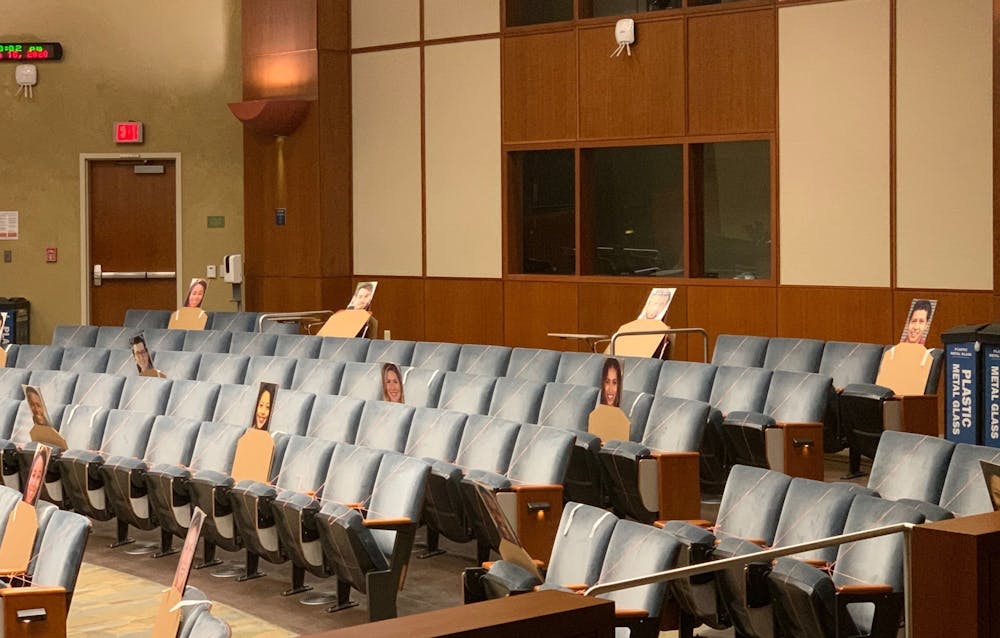As the fall semester winds down, professors across departments agreed that it has been a challenging few months for faculty as well as students.
This fall, Prof. Michael Wormington taught cell biology — a required course for biology majors — online. Wormington, who has taught at the University since 1993, said that this semester was one of the hardest he has ever experienced. He said that he doesn’t think his challenges have been that different from students given that professors have to deal with similar situations, such as being isolated from other faculty members and using online platforms for classes.
Given that Wormington’s class this semester had almost 400 students, he said it has been especially difficult to get to know his students even though the class was synchronous.
“I'd say the largest difference and the one that I have struggled with the most is the inability to be able to interact with our students in person,” Wormington said. “We've realized how much we miss, and we need that interpersonal interaction with our students and that more than anything has really been the biggest loss.”
In an effort to bridge the gap between himself and students, Wormington set up coffee chats during which students could meet a half hour before class. Through these coffee chats, Wormington said he got to know a great group of students while discussing class and sometimes even engaging in political discussions.
While Spanish Prof. Francisco Valverde did not teach a large lecture class this semester, he said that teaching his online synchronous Spanish poetry classes of around 25 students also presented challenges. Valverde said he believes that we have all become fearful and vulnerable of our weaknesses during these times of COVID-19, and for that reason, he tried to make poetry an instrument for relieving the anxiety and fear of his students.
“I believe that one of the most fundamental aspects of life is to care for others,” Valverde said in an email to The Cavalier Daily. “That builds us up and rebuilds us. Poetry is also a form of caring.”
Similarly, Asst. Politics Prof. Rachel Potter taught a mid-size politics class of around 30 students and said that this semester has been a “surreal experience” for her. In an email to The Cavalier Daily, Potter said that she misses getting to know her students and the “serendipity of in-person exchanges,” both of which are difficult to recreate in the online classroom setting.
Potter also highlighted how difficult it has been to pick up on when students are stuck or not understanding the material while on Zoom.
“Teaching is more challenging in the online format,” Potter said. “Usually, when I teach, I look out into the classroom to gauge students’ reactions. Did they understand? Are they confused or frustrated? It’s much harder to get that feedback from a little square of a student’s video online — especially if their camera is not on.”
Assoc. Mathematics Prof. Jim Rolf, the course coordinator for Survey of Calculus II, taught an online discussion section of around 30 students. He also said that this semester has been quite difficult in terms of creating course material, training the other five instructors and ensuring that students have a good learning experience.
Rolf said that it has been especially difficult to teach math online given that it is harder to help students when they have questions because they are forced to use digital assets such as software to watch videos, read the textbook and take quizzes. In person, Rolf said it is much easier for him to serve as a resource, given that he can walk around the class and help individual students or use the chalkboard to clarify problems.
Overall, Rolf said that even though the transition to online learning has been difficult, his students have not given up.
“I think it's been challenging for everybody — it's challenging for the students, it's challenging for the faculty,” Rolf said. “I feel like my students have a decent attitude about things. They're putting effort in, so I am grateful. I let them know I’ve realized that they are working hard and I'm working hard and we're in this together.”
Potter said that she is beginning to sense a lot of Zoom fatigue from students as classes come to an end Nov 24. Similarly, Wormington said that he has begun to notice the dwindling number of participants in his class as the semester closes. In order to combat this same Zoom fatigue next semester, Potter says that she will encourage students to take their laptop outside given that as the spring semester closes in May, Charlottesville spring will be in full bloom.
Wormington said that he hopes that next semester people will be moving towards getting vaccinated for COVID-19 — if a vaccine is available by then — and that group immunity will begin to take over.
“We are still going to have to take precautions, we're still going to have to wear masks and that's just how it's going to be,” Wormington said. “But I do think people are becoming a little bit more creative about how we can try and incorporate in-person [classes].”
While Valverde said that he believes that online teaching has been an excellent recourse in an emergency situation, he also believes that teaching in person is much more rewarding. Ultimately, Valverde thinks that students already spend so much time looking at screens, and the addition of online classes may increase their sense of loneliness.
“Our students spend too much time looking at the screens of their cell phones or their computers to the point of losing contact with reality,” Valverde said. “Technology is useful but it can increase our sense of solitude. I don’t believe that any computer program can be a substitute for the university experience of sharing knowledge in the Humanist tradition.”







